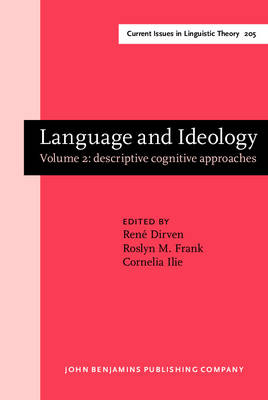
Language and Ideology
John Benjamins Publishing Co (Verlag)
978-90-272-3712-5 (ISBN)
Together with its sister volume on Theoretical Cognitive Approaches, this volume explores the contribution which cognitive linguistics can make to the identification and analysis of overt and hidden ideologies. This volume shows that descriptive tools which cognitive linguistics developed for the analysis of language-in-use are highly efficient for the analysis of ideologies as well. Amongst them are the concept of grounding and the speaker’s deictic centre, iconographic reference, frames, cultural cognitive models as a subgroup of Idealized Cognitive Models, conceptual metaphors, root metaphors, frames as groups of metaphors, mental spaces, and conceptual blending.
The first section ‘Political metaphor and ideology’ discusses topics such as Nazi Germany, discrimination of Afro-Americans, South Africa’s “rainbow nation”, and the impeachment campaign against President Clinton. The second section, on cross-cultural “Otherness” deals with cultural clashes such as those between the Basque symbolic world and the general European value systems; between the Islam and the West, determining its treatment of Iraq in the Gulf War; and between Hong Kong “Otherness” and centuries of Western dominance. The third section deals with ‘Metaphors for institutional ideologies’ and concentrates on the globalisation of the North and South American markets, on insults in (un)parliamentary debates, and on the Internet being for sale.
1. Introduction (by Dirven, Rene); 2. Part A: Political Ideologies; 3. Ideology, metaphor and iconographic reference (by Hawkins, Bruce); 4. The deictic foundation of ideology, with reference to African Renaissance (by Botha, Willem J.); 5. The semantics of impeachment: Meanings and models in a political conflict (by Morgan, Pamela S.); 6. Part B: Ideologies of Crosscultural Otherness; 7. Philistines, barbarians, aliens, et alii: Cognitive semantics in political 'otherness' (by Sego, Lewis); 8. The bare past as an ideological construction in Hong Kong discourse (by Grundy, Peter); 9. Conflicting identities: A comparative study of non-commensurate root metaphors in Basque and European image schemata (by Frank, Roslyn M.); 10. The Otherness of the Orient: Politico-cultural implications of ideological categorisations (by Sandikcioglu, Esra); 11. Part C: Institutional Ideologies; 12. Even the interface is for sale: Metaphors, visual blends and the hidden ideology of the internet (by Rohrer, Tim); 13. Globalisation for beginners in Argentina: A cognitive approach (by Severino, Liliana Cubo de); 14. Unparliamentary language: Insults as cognitive forms of ideological confrontation (by Ilie, Cornelia); 15. Subject index
| Erscheint lt. Verlag | 8.3.2001 |
|---|---|
| Reihe/Serie | Current Issues in Linguistic Theory ; 205 |
| Verlagsort | Amsterdam |
| Sprache | englisch |
| Gewicht | 500 g |
| Themenwelt | Geisteswissenschaften ► Philosophie ► Sprachphilosophie |
| Geisteswissenschaften ► Sprach- / Literaturwissenschaft ► Sprachwissenschaft | |
| Sozialwissenschaften ► Politik / Verwaltung ► Politische Theorie | |
| ISBN-10 | 90-272-3712-3 / 9027237123 |
| ISBN-13 | 978-90-272-3712-5 / 9789027237125 |
| Zustand | Neuware |
| Haben Sie eine Frage zum Produkt? |
aus dem Bereich


